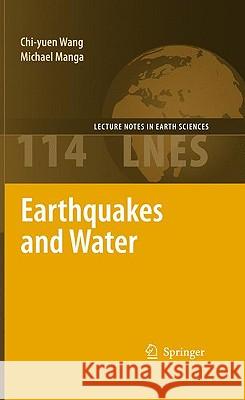Earthquakes and Water » książka
Earthquakes and Water
ISBN-13: 9783642008092 / Angielski / Twarda / 2010 / 225 str.
Distantearthquakesarewellknowntoinduceawiderangeofresponsesinsurface water and groundwater. These responses are often viewed as mere curiositiesas theiroccurrenceislimitedinspaceandtime.Thefrequentemphasisonearthquake precursorsinstudiesofthesephenomenaalsotendstopushthestudyof earthquake hydrology away from the mainstream of geoscience. The observed phenomena, however, probetheinteractionbetweenhydrogeologicalprocessesandmechanical deformationintheshallowcrust.Hencetheyprovideinsightintotheinteraction among water cycle, tectonics, and properties of the crust. As such, the study of earthquakehydrologyalsohasthepotentialtoprovideamorequantitativeand- depthunderstandingofthenatureofearthquakeprecursorsandevaluatewhether theyareinfactprecursors. The title of this book re ects the nature of the connections we address: we focus on how earthquakes affect hydrology. Water also in uences earthquakes as it affects the strength of faults and the rheology of rocks. Our emphasis here, however, is not on the hydrology of earthquakes, but on understanding the hydrological phenomena induced or modi ed by earthquakes. The boundary betweenthe hydrologyofearthquakes andthe earthquake-inducedhydrological phenomena, however, can sometimes be blurred. For example, triggered ear- quakes are sometimes explained by a re-distribution of pore pressure following the triggering earthquake. Hence, triggered seismicity may be an example of an earthquake-induced hydrological phenomenon. Thestudyofthelatter, therefore, canbeimportanttowardsabetterunderstandingofthemechanicsofatleastsome earthquakes. Therearemanystudents, postdocsandcolleagueswewishtothankforcolla- ratingonresearchprojectsrelatedtothetopicsreviewedinthisbook, orparticip- inginstimulatingdiscussionsintheclasswetaughtcalled Earthquakehydrology . In particular, we wish to thank Emily Brodsky, Yeeping Chia, Douglas Dreger, Shemin Ge, Fu-qiong Huang, Tom Holzer, Chris Huber, Joel Rowland, Martin Saar, Yaolin Shi, Chung-Ho Wang, Kelin Wang, Pei-ling Wang and Alex Wong forenlighteningexchanges.HunterPhilsonhelpedwith guresandtheindex.We v vi Preface alsothanktheNationalScienceFoundation, theMillerInstituteforBasicResearch inScience, andNASAforsupportingtheresearchandsynthesisinthisvolume."











